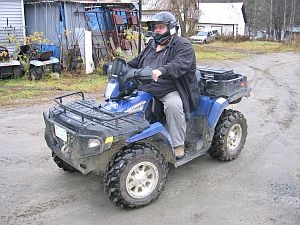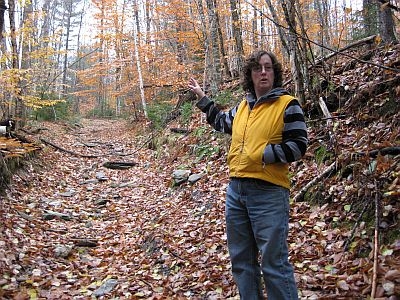
(Host) The Douglas Administration’s proposal to allow all-terrain vehicles on state land has stirred up strong feelings around the state.
The Agency of Natural Resources received about 2-thousand letters and emails on the proposal.
Comments ran four-to-one in opposition, as many people shared their personal experiences.
VPR’s John Dillon takes a closer look at the controversy.
(Sound of ATV starting)
(Dillon) Danny Hale fires up his four-stroke Polaris ATV for a quick ride around his Hardwick yard. Hale says he’s been around motors all his life – his grandfather sold snowmachines for years.
(Hale) "So I grew up with motor sports. That’s what we did. We recreated around motor sports."
(Dillon) Hale is executive director of the Vermont All-Terrain Sportsman’s Association, known as VASA. The group has pushed for the rule that would allow ATV riders to use state land to connect private trail networks. Hale explains the allure of riding a four-wheeler into the backcountry.
(Hale) "A lot of us today in VASA are people that are in their retirement that can no longer get out and walk great distances in the woods but still enjoy being in the woods, enjoy seeing the scenery. VASA trails have some great views. We have club activities, poker rides, barbecues. It’s a culture, and it’s a large culture here in Vermont."
(Dillon) But the proposal to allow the machines on state lands has also brought out a clash of cultures.
The collision is between those who like to see nature from the seat of an ATV – and those who prefer to travel the woods on foot, bike or horseback.
(Sargent) "To me, it’s a destruction of the land, but the other thing I think is just as equal is interfering with other uses. I do not believe that motorized recreation and non motorized recreation are compatible."
(Dillon) Deb Sargent lives on a back road in Moretown. She and her husband were among the two thousand people who commented on the proposed rule. Their letter included photos showing erosion and trail damage from what they said was years of illegal ATV use.

To get to one of her trails, we cross a small stream where ATVs have gouged deep ruts from the bank to the water.
(Sargent) "It doesn’t take much. And actually it was like this after about two people went by, two passes went by. The soil can’t handle it. And these ruts are already about four or five inches deep."
(Dillon) Erosion has now made the Sargent’s trail look more like a deep ditch than a footpath. At one point, she says, ATV riders made a new trail through her property without permission.
(Sargent) "Actually I heard chainsaws and I thought, okay, that’s my neighbor. And I came up afterwards and they had cut through this loop into our property, never stopped and talked to us, asked us or anything — they just did it."
(Dillon) But Danny Hale of the ATV association says his organization wants to work with landowners to crack down on illegal riders.
(Hale) "Call my number, let me know. We’ll do what we can to try to stop it. I’m not guaranteeing I’m going to stop it. But I am guaranteeing you that VASA will do everything they can to help you with your problems. And long term, I think that will make a difference."
(Dillon) Hale says ATV riders are taxpayers who have earned the right to access public land. That’s also the view of Dan Fecteau, who likes to ride his ATV through the woods of Orange County.
(Fecteau) "I’m not a hiker, don’t pretend to be, but at the same time it gives me access to that area. And I get to take a look and see a lot of nice scenery, get to see some different animals. It’s fun just because you get to experience more of the state."
(Dillon) In Moretown, Deb Sargent says everyone should have access to state land. But she says that doesn’t have to include riding machines through the woods.
(Sargent) "No one is preventing them access. They can walk, they can bike. … They’re not getting any less access than anyone else. It’s their vehicle that can’t have the access."
(Dillon) There are also questions about whether the state has the resources to crack down on illegal riding. Several state biologists have made their concerns known to their superiors in internal emails. One biologist this summer investigated illegal ATV trails cut through a remote section of Marshfield state forest that holds endangered plants as well as a peregrine falcon nest.
But Natural Resources Secretary Jonathan Wood says allowing ATV riders on state land should make them more responsible.
(Wood) "And they help us, both paying for enforcement and doing enforcement on the ground informally through their organizations. This will actually assist us tremendously in a situation where the illegal riding is hard to police."
(Dillon) Not everyone in state government agrees that state-sanctioned trails will reduce illegal use. The state biologist who documented the damage to the Marshfield forest said, quote – "I’m not sure that’s realistic."
And after seeing what happened to her trail in Moretown, Deb Sargent questions whether peer pressure from other riders will do much to change behavior
(Sargent) "From our experience here we just haven’t seen that that works. Because ultimately ATVs are sold as high-powered machines to drive fast through the woods."
(Dillon) Danny Hale says the renegade riders can be controlled. And he’s asking for a chance to show it can be done.
(Hale) "What we’re going to be doing is having a managed trail that is going to be under a great deal of scrutiny from all parties. VASA will not tolerate or be able to allow illegal riding."
(Dillon) The debate will continue this week when a legislative committee takes up the proposed ATV rule.
For VPR News, I’m John Dillon in Montpelier.